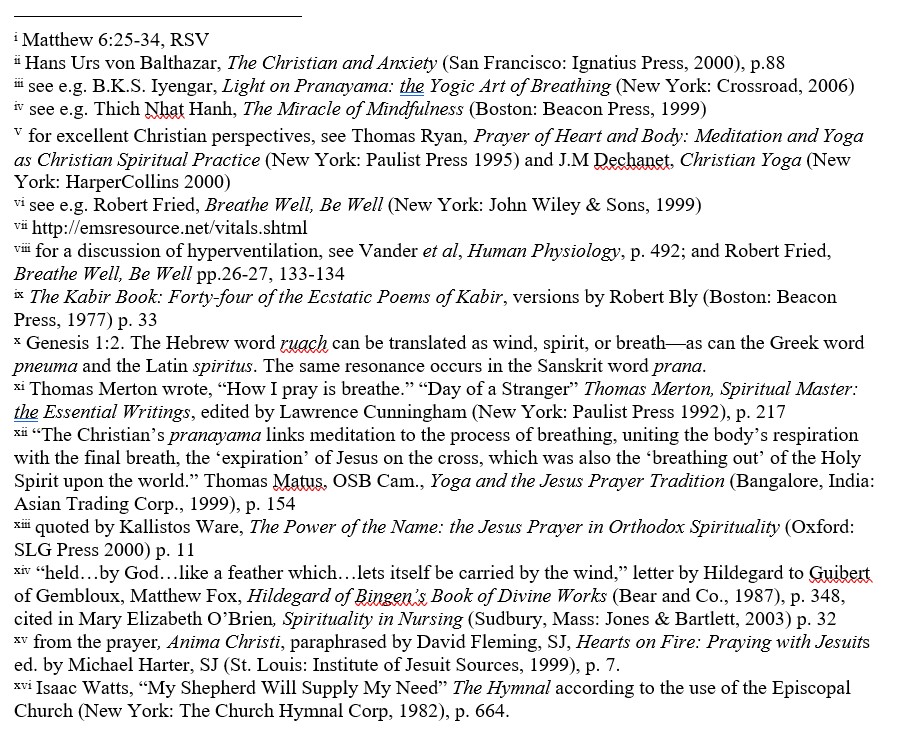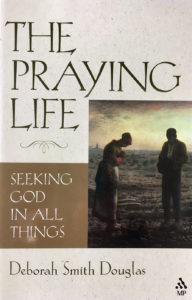Feathers on the Breath of God
 The idea of my writing anything useful about “not being anxious” would make many who know me laugh out loud.
The idea of my writing anything useful about “not being anxious” would make many who know me laugh out loud.
I am expert on—I practically have advanced degrees in—not deep-slow-breathing trust in God, but white-knuckled hyper-ventilating faith-denying fear.
I seem to be hardwired with a hair-trigger alarm response. No matter how deeply I think I know that nothing can separate me from the love of God, that I cannot add a single hour to my life by being anxious, nevertheless forecasts of trouble can hurl me into hurricanes of dread. Most of my life, I have far more closely resembled Chicken Little, panicking that the sky is falling because an acorn has hit my head, than Daniel in the lion’s den trusting God to deliver him.
Personal experience has made me especially aware that anxiety and breathlessness are kin. Some years ago I developed all the symptoms of asthma. The terror of that struggle to breathe—comparable, as they say, to sucking peanut butter through a straw—has remained with me, though (thank God) the asthma attacks have not returned.
Recently during a family crisis I kept dizzily realizing—just on the point of fainting—that I had been essentially holding my breath for hours. My daughter wrote “Breathe in, Breathe out” on a slip of paper and taped it firmly inside my billfold so I would remember to exhale whenever I saw it.
I wish I could remember to breathe without having to be reminded. I regret how quickly I forget, how instantly I get slammed back into the place of anxiety, the place of held breath.
Because I spend so much of my life in the shallow end of my breath, so much time and energy worrying about situations I cannot control, I am also often anxious about being anxious—uneasily aware of all the Biblical injunctions against anxiety as a sin against faith.
“Do not be anxious about your life,” Jesus commands.i God knows what we need and will provide it.

When the disciples are terrified of the storm at sea, Jesus orders the wind and waves to be still, and then reproaches the disciples for their lack of faith in His saving presence: “Why are you afraid? Have you no faith?” (Mark 4:40)
I know I am often in the same boat with the disciples—so much more aware of the darkness and tumult around me than of the presence of my Savior in the stern. So much more inclined toward anxiety than trust.
And I know this is contrary to the way Jesus invites us to live.
“Anxiousness is among the things the Lord has forbidden…unambiguously, irrevocably, adamantly, and trenchantly.”ii This is not a moral prohibition—as though by strenuous exercise of virtue we could conquer our terrors on our own—or as though there is something shameful in being human and thereby inevitably acquainted with fear.
Rather the injunction to “be not anxious” is an invitation into courage and hope and radical trust. We are assured by Love Incarnate that we are so eternally companioned by God that there is simply nothing on earth, nothing that can happen to us, which we need fear.
I accept this promise (theoretically) as saving truth.
Why then, at the first waves that beat into the boat, the first stabs of apprehension, do I once more struggle to breathe? “Have I no faith?” I have confessed this anxiety as sin, I have striven mightily to bring my heart in line with my head, but still, God knows, I am anxious.
This struggle to reconcile my professed faith with my manifest anxiety—and the discouraging extent to which this is all tangled up in my airways—led me years ago to the venerable disciplines of yogaiii and meditation,iv which promise awareness and control of breath as a way to quiet the mind.v Deep slow breathing (these ancient guides assure me) slows the pulse, calms the nerves, can relieve pain and treat illness.vi Being mindful of our breathing can prevent the scattering of our thoughts, and facilitate the mind’s wholeness.
Breathing, like believing, is part gift, part discipline.
And it is entirely amazing.
Every breath we take—and we take more than 20,000 every day of our livesvii—involves an astoundingly intricate dynamic of call and response, a kind of country dance in which nerves, muscles, bones and blood cells throughout the body move together and apart in an ancient ordered rhythm.
Our heart and lungs work tirelessly together in this elegant choreography, circulating oxygen-laden blood throughout the body, drawing air in and out of the lungs—as the earth’s oceans respond to the pull of sun and moon to lift the tides in and out on every shore.
When we breathe deeply, air flows into the lungs—the only part of the body where the blood-oxygen transfer on which our lives depend occurs. When our breath is shallow, the vital oxygen never reaches the tiny capillaries in our lungs, and it cannot embark upon its remarkable journey into the farthest reaches of our bodies. Rapid shallow breathing makes us lightheaded, and will eventually cause us to faint, as the brain is deprived of oxygen.viii
Unless we maintain contact with the depths, we isolate ourselves from the lifegiving air we must breathe to live.
This is both basic physiology, and elemental yoga. It is also Biblical wisdom, and deep mystical theology.
Yogic teaching insists on the importance of deep controlled breathing not just for health of body and quietness of mind, but because deep breathing can connect us with the life-energy that fills the universe, that is the breath of God. Becoming attentive to and disciplining our human breath, we become aware of, and can align ourselves with, the dynamic power of life itself.
God is, as the 15th century Sufi poet Kabir knew, “the Breath within the breath.”ix And that Breath is not so much something we breathe as a mystery that breathes us.
“Let the Breath breathe you,” my yoga teacher urges.
The breath of God, the book of Genesis tells us, moved over the waters of uncreated chaos at the creation of the world.x God breathed life into inanimate dust and created Adam (Genesis 2:7). The Risen Christ breathed on the frightened disciples and transformed them into bold apostles (John 20:22).
God’s breath creates us, makes us human, “inspires” us to be followers of Christ.
God’s own life breathed into us gives us life as surely—and as steadily—as the air we draw into our lungs. And it is possible—contemplatives have known for millennia—to unite our prayer with our breath.xi By the grace of God and the wonderful way we are made, we can join our embodied selves to the breath of God, to the very breath of our Incarnate, Risen Lord.xii
The early Christian tradition of the Jesus Prayer specifically linked the continual invocation of the name of Jesus with the breath. “Let the remembrance of Jesus be united to your every breath,” the 6th century monk St. John Climacus urged.xiii Those who would master this kind of unceasing mystical prayer were told to “breathe Jesus” continually.
Hildegard of Bingen, a 14th century mystic, wrote that when her spirit flew, it was not because of anything in herself, but because God bore her up. She floated effortlessly, totally surrendered in perfect trust—a feather on the breath of God.xiv
What a contrast to our own anxiety, with its constricting grip on mind and heart, the imprisoning narrowness of shallow breath. What a glorious possibility, to live not in the tight clutch of anxiety, but as feathers on the breath of God.
But that is precisely my problem. When anxiety grabs me by the throat I cannot will my lungs to relax. In those times, surrendering is exactly what I cannot do.
However, this very realization allows me to see how I keep getting all this wrong—how, like a drowning person, I struggle so hard to be saved that I impede my own rescue.
It is precisely in those moments of inability to surrender my anxiety—in my wild striving to save myself, to get abandonment right, to haul myself bodily into faith—that I am in the same boat as the terrified disciples that night in the storm at sea. I see waves coming in, filling the boat with water, and I fear that I will perish and that God doesn’t care if I do (and then I am anxious about my lack of faith, compounding my turmoil). I am so fixated on the wind and waves (and on my fixation) that I forget that Jesus is present, and that “with him by my side, enough has been given.”xv
The faith that I crave would enable me to trust God to carry me safe to shore, no matter what the present danger, no matter how wild the sea and dark the night.
But how do I get from here to there?
Maybe I must first surrender trying to surrender.
Maybe I should just breathe in and out and remember that the peace and trust I long for are not something to be grasped.
Trust is, like breath itself, a balance of will and grace, of discipline and gift. A kind of dance, combining quiet gratitude for God’s saving presence with the “breathing lessons” of deliberately relinquishing fear and self-will.
In the end, it wasn’t the disciples’ own efforts that stilled the storm. Jesus commanded the storm to cease; Jesus breathed on the frightened disciples in the upper room and gave them His peace.
Living as feathers on the breath of God is not, ultimately, something any of us—even the greatest saints—in fact achieve. It is not an invitation, but a fact. That is the alarming reality of our situation: we really are (all our frantic illusions to the contrary notwithstanding) that vulnerable, that precarious, that radically not in control. But we are also that safe, that intimately close to the Breath that created, redeemed, and sustains the universe in love.
Sometimes, by grace, I have glimpses of what it might feel like to let God’s “supporting breath drive all my fears away.”xvi

Once I was alone in a sea kayak off the coast of Maine—so far beyond the breakers that in the trough of every wave I completely lost sight of the land. All I could see, in those rhythmic alternating moments, was ocean and sky. I stopped struggling to make headway toward the shore (knowing at some level that the waves would bear me there eventually). I rested the paddle over the gunwales and let myself in my slender craft be carried by the waves, borne irresistibly up and down, in and out, with the swell of the sea. I felt—viscerally—as though I were on the back of a great living creature, riding the lift and fall of its unimaginably vast breath. I was, in that moment, letting the Breath breathe me.
I was completely unafraid. For that small time out of time, I knew without trying that God was near. I was not anxious about anything.
In my (still, God help me) recurring times of anxiety, I remember such moments gratefully. These memories help me to trust—even when I am not able to sustain the awareness—that I continually live as a feather on the breath of God, as once I floated in a small boat on an endless sea.
I will keep breathing in and out. I will keep praying.
Eventually, I hope I can come to trust more steadily that faith is not so much about my perfecting the way I breathe as about remembering that God is with me always, as close as my next breath. And God will bear me up in any storm, at any unfathomable depth, through whatever I must endure, in this life and the next.


